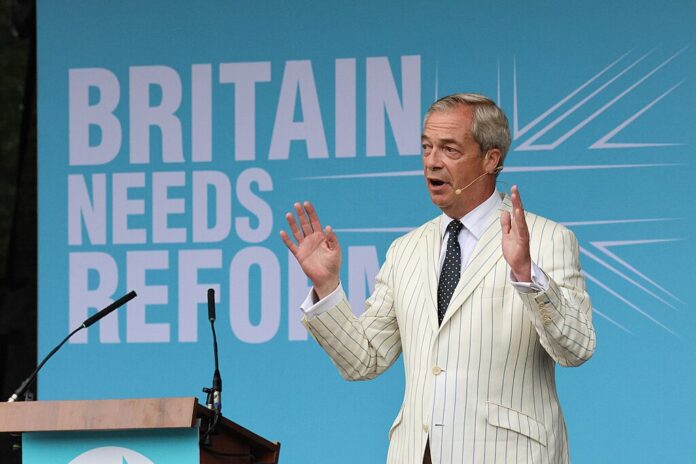The reform UK leader faces backlash over controversial comments on Southport tragedies and a planned protest outside his office
Nigel Farage, leader of Reform UK, has stirred controversy by accusing the UK media and government of conspiring to support “open borders.” Farage’s comments come as his popularity takes a significant hit amid ongoing unrest related to the Southport stabbings.
In a recent video directed at billionaire Elon Musk, Farage echoed Musk’s criticism of the UK government, alleging that media outlets are complicit in promoting a pro-open borders agenda. Musk, who has been vocal about his discontent with the UK’s handling of recent far-right riots, has also criticized the UK authorities for their approach to managing hate speech and misinformation on social media.
Embed from Getty ImagesFarage’s remarks intensified as he doubled down on his claims about the Southport stabbings, where three young girls were killed last week. Farage suggested that the authorities have been withholding critical information about the suspect, fueling public outrage and contributing to subsequent riots. Despite evidence that false information about the suspect’s background was circulated on social media, leading to increased racial tensions, Farage maintained his stance that the lack of timely information was a significant factor in the unrest.
On Talk TV, Farage questioned why the authorities had not disclosed whether the suspect was on a watch list, comparing the situation to the quick identification of attackers in previous incidents like the London Bridge attacks. His persistent claims have come under sharp criticism, especially as new polling reveals a dramatic decline in his approval ratings.
Recent YouGov polling shows Farage’s net favorability score plummeting from -35 to -42 within a week. Approximately 67% of Britons now view him unfavourably, while only 25% hold a favourable opinion. Farage’s approval rating among Brexit voters has also dropped, indicating a broader loss of support.
Adding to the turmoil, a protest is scheduled outside the Reform UK headquarters, with organizers accusing Farage of inciting and rationalizing racist and fascist behaviour. The planned demonstration, set for August 10, aims to address what they see as a rise in extreme violence linked to Farage’s rhetoric.
In response, Farage condemned the protest as “absolutely disgusting” and “inciteful.” He has been offered additional security by the Home Office due to escalating threats against him. Farage has been the target of various attacks in the past, including incidents during election campaigns.
Despite accusations from figures like Brendan Cox, the widower of murdered MP Jo Cox, who labeled Farage’s actions as incitement of violence, Farage has defended his position. He insists that his commitment to the democratic process remains steadfast, rejecting claims of promoting violence or street protests.
Analysis
Political
Farage’s outreach to Elon Musk and his conspiracy claims reflect a broader political climate marked by increasing polarization and scepticism toward mainstream media and government institutions. His criticism of the UK government aligns with a growing trend among populist leaders who challenge established narratives and institutions. This approach may resonate with his base but risks further alienating the broader electorate, impacting his political influence and future electoral prospects.
Social
The controversy surrounding Farage highlights societal divisions over immigration and border policies. His comments tap into public frustrations about perceived failures in addressing immigration and integration issues. The debate over the Southport stabbings and subsequent riots underscores the tensions between different societal groups, reflecting broader concerns about social cohesion and the role of media in shaping public perception.
Racial
Farage’s remarks and the resulting riots have intensified discussions about race and immigration in the UK. The spread of false information and its role in inflaming racial tensions emphasizes the impact of misinformation on societal harmony. The backlash against Farage’s alleged role in promoting racial discord highlights the ongoing challenges in addressing and combating racism in public discourse.
Gender
While the controversy primarily focuses on immigration and political rhetoric, the broader implications for gender dynamics are subtle. The way Farage and other political figures navigate public scrutiny and backlash may influence perceptions of leadership and responsibility. Gender dynamics in political activism and public reactions often intersect with issues of race and immigration, shaping the overall discourse.
Economic
The economic implications of Farage’s declining approval ratings and the planned protests are multifaceted. Political instability and public unrest can impact investor confidence and economic stability. Additionally, the increased security measures and the costs associated with managing public protests and potential violence can strain public resources and impact local economies.
